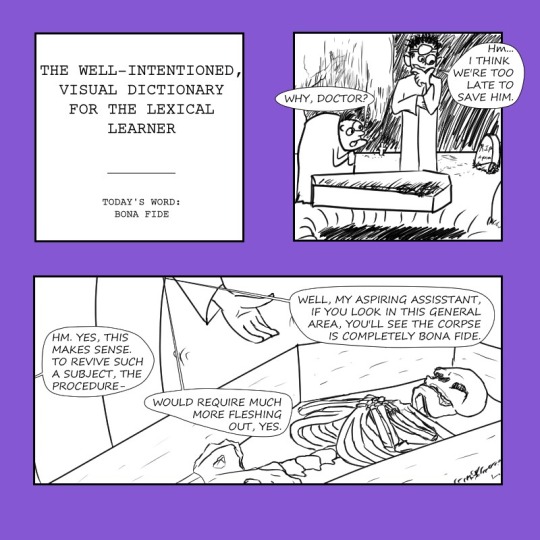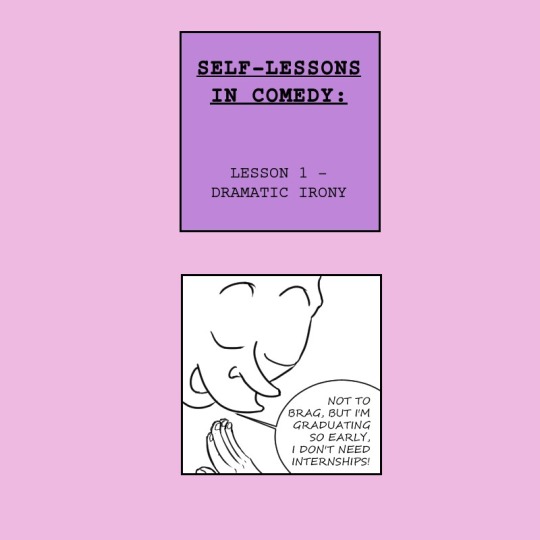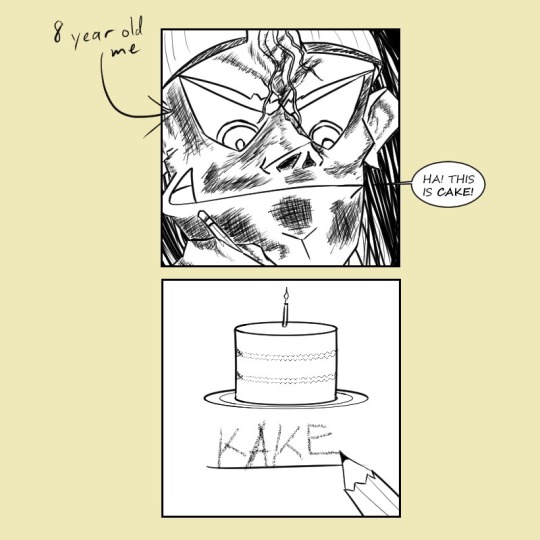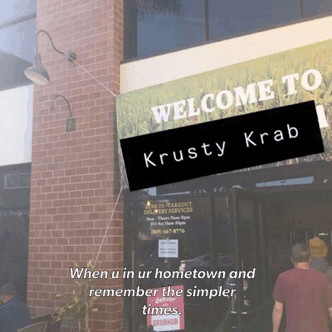Text
It flashed through the sky…
…and then was gone. Lucy was sure she had seen a UFO and was equally sure aliens were here to secretly make contact with a human being. Maybe they would choose her. Maybe she would get to visit their ship. Maybe…
…she could tell them everything that happened with her mom, the strange dream, all of it. She hoped they could make sense of it. She hoped…maybe they had her mother. The dream, it had been weeks since she had it, but it wouldn’t leave her mind.
She could tell them what it was like back then, what her mom was like, and she couldn’t make sense of how. She could describe it all to them, that same austere, unloving air she had grown 8 years in, except, it was different once, the very opposite, in fact. The dream showed her so.
Long ago, a loving man, her father, and a woman had settled in the place she and her father only called a ‘house.’ They called it ‘home.’ Her father acted like a different man, bustling about with wood and tools, building a fence here, a tool shed there, and other wooden things that Lucy had only ever seen in shambles. He was active, and always improving. Given the shell her father was, she found it hard to recognize the person inside.
A beautiful garden reached around the outside of the structure. The woman, her mom, seemed to always be out there, putting the plants in rows, harvesting. Lucy didn’t know what exactly she was doing; she knew nothing about gardening, but she could see that her mom was happy. And her father too. Lucy felt tears well up in the dream when she saw this; another question for the aliens.
But something happened, and like a switch flipping, everything changed to resemble what Lucy knew. The home went silent, the garden outside went wild, and died, strangled by weeds. All the work they did, Lucy saw it disintegrate in a second, without explanation. The next scene in the dream, she wished she could forget, but a sinking feeling told her she never would.
Her mom hadn’t been sleeping for a time, at least, not to Lucy’s knowledge. It looked like the life was being drained out of her, and concentrated into a bulging, purpling globe in her abdomen. Everywhere else, her mom’s skin had grown grey, and clammy. The eyes especially, they looked dark, like deepening, frigid pits. For a while, the tips of her nose, fingers and ears had grown pink, as if these sites were the selected refuge for rebellious color in her paling body, as far from the belly as possible. Even these had started fading though. “Oh, nothing’s wrong with mommy, sweetie. She just hasn’t put her makeup on in a while.” Lucy’s father said that. She would never forget it, nor the way it twisted her stomach.
Right after he spoke, her mom’s face streamed with tears. She looked like a statue in the rain. She didn’t move, hardly breathed, and she was silent. It was as if her eyes had just suddenly sprung a leak.
The back door opened. “Well, I’ll see you both later toni—” It shut prematurely. As quickly as the silence broke, a new one took its place, a much sadder, fearful one. When her mom opened her eyes, though, and looked at Lucy, it was like she recognized something, and the trembling left her voice, and the sobbing softened. One might even say there was an air of relief to the room’s melancholy.
Her mother sat the same, still silently weeping on the sofa, trying not to stare at Lucy with a look somewhere between confusion and disgust. Lucy recalled—in the dream, which felt strange to her—that she hadn’t ever been alone with her like this before. She recalled countless days and nights in the woods, just outside, peering at the house from nearby.
She had always been outside when her dad left. She wondered if this was what inside was always like for them. Being an 8 year old, she just did what seemed right. She got onto the sofa, next to her mom, and hugged her. Her mother’s crying grew then, audible among the silence. Lucy thought she should stop, but then she felt her mother’s arms wrap around her. And then her mother spoke, only once. “Whatever you are, please, watch after my daughter. When I’m gone, watch after my Lucy…her father won’t.”
It had been a couple of days since then. Lucy hadn’t seen her mom today. Or her father. But her mother’s words, they hadn’t left her. Perhaps the hope for some little green men to explain everything and fix it was a like desperate. Lucy didn’t care. She knew things were broken. Important things, like grandma’s vase. So off she went. She’d never see that house again.
0 notes
Text
The yellow lines
on the highway all speed by in a blur, and we flew through the night, and we felt free. But we weren’t, and we knew it. We were running away from something, and running away was never the path to freedom. I thought about telling John to turn back. I thought about suggesting we ditch the car and run away naked into the desert. Maybe they’d think we were killed by a pack of coyotes during a piss break. Maybe we would be.
At the time, I didn’t care; we still had each other. And either way, even that was better than what waited for us back home, a slow, grey life spent in a slow, grey cubicle. An endless slave drive, where a magical number made all exploitation okay. Perhaps we’d get paid in paper, like in the old days. Not likely; people couldn’t be tracked well that way anymore, so ‘legitimate establishments’ only took large bills (nothing under $100), and had no change, not ever.
Maybe we’d have a kid, an excuse to accept the miserable lives we’d built for ourselves as simple fact. Maybe we could make their life miserable, as payment for all our failures, even when we had the best intentions. And from there, our lives could continue along the predictable pattern John and I had come to loathe everything for: settle down, get married, buy a house, have a baby, raise them, forget what it’s like to not have a house or children, panic when we no longer have children, age, have a health crisis or two each, retire, and watch everything drift away, slowly, as we slowly die, likely one at a time, but hopefully not too far apart.
Not too long into our ‘little flight of fancy’ (the euphemism or parents would be sure to use for this episode) I realized this was what we were running from, and that this was all around us. LA, Tehachapi, it didn’t matter where; this fate waited for us. Nearly as quick, John noted my despair.
“What’s the matter?”
I hesitated to respond. The momentum we’d made was so precious. Would I really wreck it all? I didn’t look at him. “What’re we actually escaping with this?”
He didn’t respond, but he didn’t stop either.
I loved him for that.
❌
0 notes
Text
I’ve lived in this town my whole life, and most of the time, that’s fine by me. But in the late fall when the sky fills with birds migrating south for the winter, traveling thousands of miles, I get homesick for places I’ve never been. Places like Buenos Aires, where the streets twist and tangle, and the buildings breathe with their own, fresh life. I imagine how the European settlement of the land might characterize the city, and how the Iberian architecture blooms into South American culture in a way that leaves one envious for having never experienced it.
I imagine myself, after living there for some time, completely at ease, with a comfortable fluency of the local dialect(s). I am sitting at a cafe, writing my next story, or designing my next world and its characters. It is late morning. The air is shining with the vibrant reflections of the downtown culture and entertainment district. I pause, take a sip of water (I will return here in the evening for a glass of wine, perhaps). My demeanor is that of the intriguing foreigner. The type who is clearly not from there, but has proven their value to the community by offering it something new.
That’s typically where the dream ends though, where the balmy summer breeze fades beneath the bite of the winter chill. My eyes open, and I look to the sky, only to see that the birds are gone, borne by the autumn winds, and replaced with the cold death of winter clouds beyond the northern horizon. Soon the roof will need to be re-covered, I think. It’ll last the winter, maybe, but not by itself. Not once the first snow comes.
At that point, I do the only thing I can : breathe, and move on. I keep an eye on the path in front of me, and watch my breath steam on the walk home. It catches the orange light of the setting sun, mimicking flames for the little heat it gives the air. And when I get home, I eventually eat dinner, and go to bed. But I don’t dream, because at that point, I’ve realized there’s nothing new.
0 notes
Text
“How did you know?” I asked, not sure I wanted the answer. I thought I had been careful. I thought she had spent the whole of last Saturday with Lisa, on their day trip to the coast. I had retrieved Mei’s gift no more than 1 hour and 24 minutes after it had been left at our front door.
Only then, in that single window of under 1.5 hours, at the heart of her outing, could she have been exposed to any evidence regarding the recent mailings. By every reliable calculation, this should have been the only possible breach in my discretion. After all, no other eyes were present to witness, and no action was ever taken in her presence. My paper trail was well covered, any potential sources, untraceable.
I had accounted for everything, including that bumbling private investigator, detective fellow, who couldn’t sort evidence from a deliberate plant. In addition, the shock in her reaction before me was proof enough of this discovery’s suddenness to-
Her shock slipped anyway, into a wry smirk.
But, she was covering, I assured myself. That’s all. Of course, there was my remark earlier, regarding the ‘gift I sent my mother,’ a copy of Fowles’s The Magus. Surely the explanation, assuming no foul play, was satisfactory. Therefore, she must have been harboring suspicions prior, though it was likely dismissed until now. That is, until the otherwise unimportant discrepancies in my explanation supplemented her theory. She must have noted something prior, particularly about the most recent package, that didn’t line up with my story. And the only source she would have in the package, itself having never been at the manor to begin with, was the mailing receipt, delivered late Saturday morning at precisely 11:17am, and retrieved by me at 12:31pm, after certain to have misled any possible snoop. And when she returned that evening, she made no indication that her day’s plans were changed. Clearly—
“The doorbell cam.”
My body’s heat flushed to my bowels.
“And I lied. About Saturday.” She stopped there. She knew I knew the rest.
My head felt such pressure, I could only think of one thing to say. “You—you slut.”
But she just smiled at me. “Right. Make sure to call before you come get anything.” She opened the door, “and tell your mom I said bye!”
F***.
16 notes
·
View notes
Text
Reporters are trained to develop a sixth sense, a nose for when a story smells fishy. And something about this one wasn’t right. First of all, there was no well-defined premise. What were we talking about? How “good of a guy” this previously anonymous benefactor of the city police department was? How he’s such a friendly genius full of the hilariously topical, yet witty quips about his “bratty little noise machines” and how his wife’s “always nagging him about this or that irrelevant thing?
“What is that? Why are you inquiring about past affiliations? Sure, we all have those old friends who got tangled up in rough crowds. Real shame, what the criminal elements will do to you. And you know how they get you? Dope! That’s why I’m investing in our local law enforcement, because blah blah blah—“ you know the rest. Like I said, sixth sense, commonly referred to as “common.”
Of all the people in our western headquarters, completely ignoring the only slightly smaller group of desperate individuals literally begging for this assignment, our top editor selected me for this vanity piece. I had a reputation, a spine. And that could be useful in a big publication like this, for all the credibility you could wring out of it.
If you’re reading this, odds are you can imagine my chagrin at the request. If not, well, take this as a first warning, I guess: don’t waste your time reading this. I didn’t waste my time writing for you anyway.
But yeah, I was pretty tiffed, to put it lightly. Imagine a work email, full of reserved, simple, and direct syntax, diction, the works, crafted for an entire work day, to say one simple message: No.
Now, imagine the reddening pressure of all the veins in and around my skull when the response came back, flowery, indulgent, verbose, circuitous and a complete denial of reality. “We’re so excited you’ve accepted this assignment! If you have any questions, please call __________ ext.#___.” Yes, the line was blank. Yet another sign of how nobody here seemed to believe in the good of sharing necessary information.
There was, however, the digital equivalent of a scrawled sticky note at the bottom: a post script, from my boss, and an automated addendum:
“Questions? Concerns? meet @11:30, conference 13b.
-sent from my iPhone.”
It was in a different font from the form-letter-body, an ornate, flowery script—the sort that you find at weddings with assigned seating. And me? I resembled the self-important uncle with tiny spectacles, who wouldn’t find his seat until he’d had his scene with some service worker who wasn’t paid enough. Looking down my nose, I mumbled the words for a seventh or eight time, ruminating. The message had been sent to several other writers as well. Was this all for the same assignment? I shook in my little cubicle, wondering why me, until she came to speak in person in conference room 13b, at 11:30.
We stood in line, myself, and several other staff members, starting as early as 11. She sauntered in with some foreign coffee at 11:38, and at about 12:17, I finally got my one chance for direct advice. I’m not sure what I had expected. “Be kind,” she expressly stated, “keep the convo where the subject wants it.” Clear enough.
“And besides,” she riposted my meek appeals, “people like you, they like Mr. Clommel, and what he’s done for our city. Fit that narrative, and you’ll have integrity, to them. To us, you’ll have your standard staff fees.” And I just sighed, knowing that I was going to write this. Like I said, sixth sense.
0 notes
Text
The wind whispered through the dark, empty trees like a warning in a foreign language. Winter was coming, and with winter the grim reminders of just how similar everything was the last time its chilled, indifferent touch brought these lands to a still. Nothing severe would happen, maybe a storm every couple of weeks or so. It would be cloudy, regularly in the mid-60s in the day, lower 50s or high 40s at night, occasionally colder. Still, nothing you’d need a sweater for, as long as you didn’t linger.
Matt, from New Mexico, didn’t appreciate the sarcasm he heard in that. Maybe that was due to his severe shivering; it had persisted the whole misty evening and night at the theme park. He hadn’t brought a sweater because “it was California,” and he wouldn’t buy one, not for his pride or his wallet.
Friends and filibusters were on his mind too, only adding to the irritation. Careers, families depended on their report getting through, and some legal response developing from there. He hated relying on the politicians, so spineless and prone to lying as they were. Always removed from the damage, the hardship, every one of them was more likely to double back on their mother’s dying wish than follow through on a promise. And that’s all they had: a liar’s promise.
He also hated being cold; always had. Perhaps some childhood trauma could explain this. He just preferred to say it annoyed him. Pile that on top of the thousands of sallow tungsten bulbs flashing for mere show, along with the general atmosphere of pure excess (which smelled like rain and turkey legs, by the way), and it made in Matt for a rotten mood. Not even California nights were warm enough to make due without a sweater. Not any more at least.
0 notes
Text
Perhaps it was a dream, she thought. Perhaps if she pinched herself, she would wake up. But she didn’t want to. She wanted to stay, here, where the people — humans or not — actually noticed her. Back home, she never realized how her search for isolation had made her so hungry for a simple human gaze. More specifically, one that wasn’t immediately quantifying her potential net worth, breedability, “market value,” was the current euphemism.
Yes, to be looked upon as a living, breathing, intelligent thing, to be regarded with simple curiosity, an innocent desire to know her and experience her way of life, with all its strengths and weaknesses. She wished to stay here, where she would be looked upon with genial, respectful love, where she could be accepted, no submission required, no promise of exchange. Back home, she knew, this would be impossible. That place, at its core, was so commercial that there was no practicable notion of human respect; that was unprofitable, impossible, basically the same thing.
And she was no different. Until now, even in the isolation of her fantasies, the forefront concerns of her mind had been ownership, of herself, of her land, of poor Polo. Even in chasing freedom from it, possession was all she had sought, to expand her being, and to fight against the intrusion of others, to prevent the endless inward recession that her empty life had been. Back home, that was taking care of yourself. It was a shitty home.
“What if I choose to stay?” she asked. Polo’s eyes held her, in a language she wasn’t yet speaking. “I mean, I don’t have to go back, do I? That place is awful, and backwards. No one cares about each other, just gives their dead hearts to heartless things. We calculate costs and benefits, discern the opportunities, conduct case studies, and we look for the numbers to tell us what to do. And when we do it, we don’t love what we get. We simply own it, and move on, caring for it according to the profit margin it gave us. But here, I love. Truly.”
She held Polo’s face, but Polo just sighed. They unclasped the chain around their neck, and extended it back to her. She wasn’t getting it. “Then take this back. It has no place here.”
0 notes
Text
“At first, we thought the black liquid was oil, that we’d struck it rich and that we’d be able to retire in leisure. We actually started writing down all the ways we’d spend the money. Our first choice was...”
... to buy a boat, and live the remainder of our lives on the sea. Curt’s father was a merchant marine. Even had a boat he’d planned on leaving to Curt when he passed. Then the storm happened.
Me, I was just agog with the prospect of having not a single neighbor within the horizon, or any yard duties. Well, there would be the deck. And we’d need to scrape the bottom for barnacles every so often, but I was willing to do all that, personally. Hell, in return for a life of days that were only as loud as you wanted, we’d’ve given anything. To wake with the sun and a short morning dip. A light meal and a good book. After I’d get some new pages in while waiting for more fish to bite. Perfection, if I’d ever imagined it.
‘Or what if,’ Curt began in that tone of his the sane me knew to doubt, ‘we didn’t sell the land?’ He tugged his eyes up from a steady, down slanted face. His lips were pursed. Clearly, he was trying to look inquisitive, and sincere, as if he’d actually consider my opinion.
‘I mean, that depends,’ I began. I would indulge his performance, slap his ego. Still, no good would come of me openly expressing just how dumb of an idea that was. ‘Do you really think we’d profit more from that than selling?’
‘In the long term.’
‘As long as we knew how to run an indie oil field?’ My skepticism was the opposite of his idea: rational and undeniable. He knew. He sighed and picked some tobacco from his pocket, and a matchbook. ‘Are you serious?’ He stopped. I didn’t sweeten that one.
‘I guess you have a point,’ he admitted, as he crouched and probed the pit.
‘Besides, we don’t even know if this is free land, how much of this stuff there is, or if it’s even—‘ my breath cut short. In a second, he struck a match and tossed it into the black pool. Nothing happened. He stood.
‘Well, I guess that answers that,’ he said, and walked back to the carriage. I stood, panting.
2 notes
·
View notes
Text
I took some historical sword-fighting lessons to make the fights in my novel more realistic - here’s what I learned.
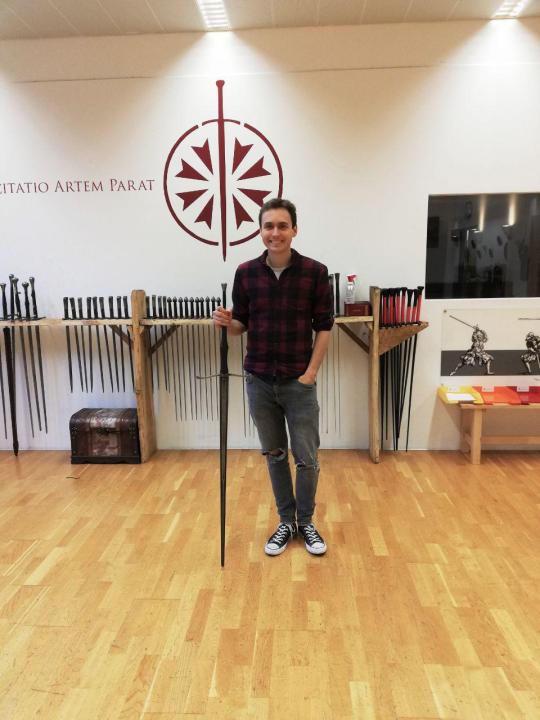
To make the fighting scenes in my low fantasy novel more realistic, I went to see a trainer for historical sword-fighting last week, both to barrage her with questions and to develop realistic choreographies for the fight scenes in the novel. Since I figured some of what she told me might be useful for you too, I put together a small list for you. Big thanks to Gladiatores Munich and Jeanne for making time! (Here are some more pictures if you’re interested.)
Caveat: I’m by no means a sword-fighting expert myself, so take these nuggets with a grain of salt – I might have misremembered or misinterpreted some of the things Jeanne told me. If I did, feel free to tell me.
1.) Weapon choices need to make sense
Let’s start with a truism: always ensure your character’s weapons make sense for a.) their profession, b.) their cultural background and c.) the environment they’re going to fight in. A farmer probably couldn’t afford a sword and might use a knife or threshing flail instead, and someone who doesn’t want to be noticed probably wouldn’t be milling about sporting a glaive or another large weapon. Also, soldiers native to a country with wide open plains would be more likely to carry long-range melee weapons such as spears or large swords, than those from a country consisting of mostly jungle or dense forests. The same applies to situations: if your character is going to be fighting in close quarters (even just a normal house), he’d get little value out of a spear or even a longsword, as there’d be no space to swing it effectively.
2.) Boldness often beats skill
In real swordfights, recklessness was often more important than technique. The fighter less afraid of getting injured would often push harder, allowing them to overpower even opponents with better technique.
3.) Even a skilled fighter rarely stands a chance when outnumbered
While a skilled (or lucky) fighter might win a two-versus-one, it’d be extremely unlikely for even a single master swordsman to win against superior numbers, even just three and if they’re below his skill level. The only way to plausibly pull this off would be to split the opponents up, perhaps by luring them into a confined space where you could take them on one by one. The moment you’re surrounded, you’re probably done for – because, unlike in Hollywood, they wouldn’t take turns attacking but come at you all at once.
4.) Dual-wielding was a thing
… at least in some cultures. I often heard people say that people using a weapon in each hand is an invention of fiction. And while my instructor confirmed that she knew of no European schools doing this—if they did, it’s not well-documented—she said it was a thing in other cultures. Example of this include the dual wakizashi in Japan or tomahawk and knife in North America. However, one of the biggest problems with the depiction of dual wielding in novels/movies/games are the “windmill”-type attacks where the fighter swings their weapons independently, hitting in succession rather than simultaneously. Normally you’d always try hitting with both weapons at once, as you’d otherwise lose your advantage.
5.) Longswords were amazing
Longswords might seem boring in comparison to other weapons, but they were incredibly effective, especially in combat situations outside the battlefield. The crossguard allowed for effective blocking of almost any kind of attack (well, maybe not an overhead strike of a Mordaxt, but still), the pommel was also used as a powerful “blunt” weapon of its own that could crack skulls. Though they were somewhat less effective against armored opponents, the long, two-handed hilt allowed for precise thrusts at uncovered body parts that made up for it.
6.) “Zweihänder” were only used for very specific combat situations
Zweihänder—massive two-handed swords—were only used for specific purposes and usually not in one-on-one combat as is often seen in movies or games. One of these purposes was using their reach to break up enemy formations. In fact, one type of two-handed sword even owed its name to that purpose: Gassenhauer (German, Gasse = alley, Hauer = striker)—the fighters literally used it to strike “alleys” into an enemy formation with wide, powerful swings.
7.) It’s all about distance
While I was subconsciously aware of this, it might be helpful to remember that distance was an incredibly important element in fights. The moment your opponent got past your weapons ideal range, it was common to either switch to a different weapon or just drop your weapon and resort to punching/choking. A good example of this are spears or polearms—very powerful as long as you maintain a certain range between you and your opponent, but the moment they get too close, your weapon is practically useless. That’s also why combatants almost always brought a second weapon into battle to fall back one.
8.) Real fights rarely lasted over a minute
Another truism, but still useful to remember: real fights didn’t last long. Usually, they were over within less than a minute, sometimes only seconds – the moment your opponent landed a hit (or your weapon broke or you were disarmed), you were done for. This is especially true for combatants wearing no or only light armor.
9.) Stop the pirouettes
Unfortunately, the spinning around and pirouetting that makes many fight scenes so enjoyable to watch (or read) is completely asinine. Unless it’s a showfight, fighters would never expose their backs to their opponent or even turn their weapon away from them.
10.) It still looks amazing
If your concern is that making your fight scenes realistic will make them less aesthetic, don’t worry. Apart from the fact that the blocks, swings and thrusts still look impressive when executed correctly, I personally felt that my fights get a lot more gripping and visceral if I respect the rules. To a certain extent, unrealistic and flashy combat is plot armor. If your characters can spin and somersault to their heart’s content and no one ever shoves a spear into their backs as they would have in real life, who survives and who doesn’t noticeably becomes arbitrary. If, on the other hand, even one slip-up can result in a combatant’s death, the stakes become palpable.
That’s about it! I hope this post is as helpful to some of you as the lessons were to me. Again, if anything I wrote here is bollocks, it’s probably my fault and not Jeanne’s. I’ll try to post more stuff like this in the future.
Cheers,
Nicolas
45K notes
·
View notes
Text
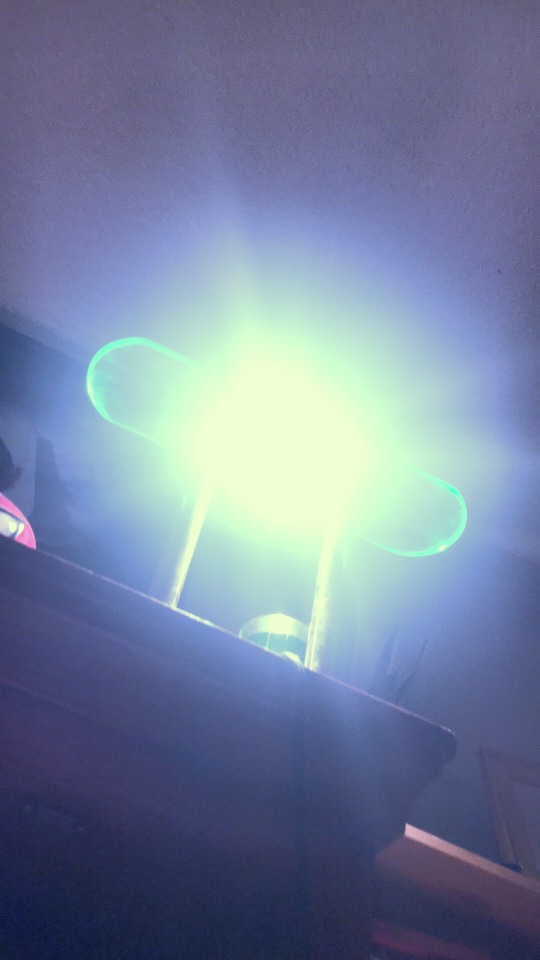
The only thing I could imagine, while in my euphoric high, was Joseph Campbell, pitching the potential self realization brings to one’s life, like some product that he, with his angelicly reverberating voice, had the most honorably fulfilling duty to sell, to as many people as possible.
0 notes
